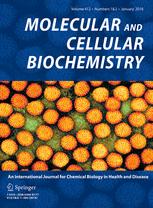 A journal has pulled a paper about the molecular details of different types of adipose tissues after learning the researchers had plagiarized much of a Ph.D. thesis.
A journal has pulled a paper about the molecular details of different types of adipose tissues after learning the researchers had plagiarized much of a Ph.D. thesis.
The researchers copied from former Ph.D. student Bettina Meissburger’s doctoral thesis in a 2013 paper in Molecular and Cellular Biochemistry. The retraction note for “Adipose stromal-vascular fraction-derived paracrine factors regulate adipogenesis” provides the name of Meissburger’s thesis:
The Editor-in-Chief retracts this article as per the Committee on Publication Ethics (COPE) guidelines on plagiarism. After a thorough investigation this article was found to contain substantial sections that were taken from a Ph.D. thesis (Molecular Mechanisms of Adipogenesis in Obesity and the Metabolic Syndrome) without proper attribution and acknowledgment.
The paper was cited twice, according to Thomson Scientific’s Web of Knowledge.
We reached out to Naranjan Dhalla, Editor-in-Chief of Molecular and Cellular Biochemistry. The corresponding author on the paper, Chunlin Li, is associated with the Chinese PLA General Hospital. We’ve reached out to Li, but have yet to receive a response.
We were unable to find contact information for Bettina Meissburger. According to her LinkedIn profile, she worked on her thesis for a little over three years (between 2007 and 2010). She received her Ph.D. at ETH in Zurich, Switzerland. She is currently a Quality Control Manager at the DKFZ German Cancer Research Center.
Geraldine Pearson, one of the vice-chairs for COPE, sent us a quote from the organization’s website, and noted she couldn’t speak about an individual case:
‘COPE does not investigate individual cases but encourages editors to ensure that cases are investigated by the appropriate authorities (usually a research institution or employer).’ As a leader in COPE I would not speak about any individual case without discussing it first with fellow COPE members.”
Like Retraction Watch? Consider making a tax-deductible contribution to support our growth. You can also follow us on Twitter, like us on Facebook, add us to your RSS reader, sign up on our homepage for an email every time there’s a new post, or subscribe to our new daily digest. Click here to review our Comments Policy.
A successful method of defeating anti-plagiarism software is to lift text from recently-uploaded, open-access theses and dissertations — before plagiarism-checking software companies have had the chance to crawl the new works and add the newly-published content to their central indexes.
For scholarly articles, most plagiarism checking is done prior to publication, so if you can clear this hurdle, you’re home free, unless someone happens to notice the copying later.
This is one way in which open-access is facilitating research misconduct. Many universities now dutifully upload their graduates’ dissertations to OA repositories, much to the delight of unethical scholarly authors.
Does it really make any difference whether plagiarism is found before or much after publication? I don’t think so. The moment an author submitted his work, he is responsible.
I believe you’re missing the point. It’s not about whether the plagiarism is found before or after the work is submitted or with whom the responsibility rests.
Beall’s point (other than taking an opportunistic shot at OA journals) is that unethical authors can ‘beat the system’ through bypassing the plagiarism detecting software that is used by editors. They can copy from a paper that is not yet part of the program’s (e.g., Turnitin) files.
It’s a gamble of sorts. On one hand, you can produce and publish a scientifically sound paper without much effort. On the other, you have to hope that the plagiarism is not subsequently noticed in the future.
So, it’s not about when the plagiarism is detected, but if it’s detected at all, which is worrisome.
And? Should there be an embargo on the release of dissertations until private software companies can digest them? Is there any evidence that they do this in the first place? This case would suggest not. So… The literature should be protected how? Having ProQuest “safeguard” it?
The very existence of the “problem” wasn’t even documented. As far as I can tell, the “other than” is the only payload, and this is without even looking at the mechanics of the collection itself.
My exasperation is not a result of your observation; I’m disappointed that Mr. Beall hasn’t returned, though, because I’m starting to feel as though I’ve invested more an order of magnitude in time thinking about his comment than he did in composing it.
Let’s see: The thesis in question was published in 2010. The paper plagiarizing it was received on 2013 June 14. This carping isn’t even specious.